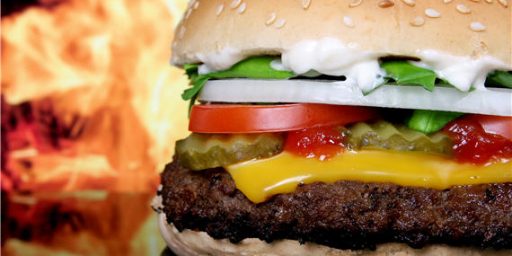Are Organic Foods more Nutritious?
One survey of studies says no.
Via the BBC: Organic food ‘not any healthier’
Eating organic food will not make you healthier, according to researchers at Stanford University, although it could cut your exposure to pesticides.
They looked at more than 200 studies of the content and associated health gains of organic and non-organic foods.
Overall, there was no discernable difference between the nutritional content, although the organic food was 30% less likely to contain pesticides.
Critics say the work is inconclusive and call for more studies.
But, then again, I always thought that one of the main reasons one might wish to eat organic foods is because of the pesticide avoidance, not because they were necessarily more nutritious.





I find organics (particularly organic meat) taste way better than the non-organics.
Yes, and one of the things we are shy about actually knowing is the pesticide load our bodies carry.
Pesticides in Breastmilk: The Good News for Vegetarians
Pesticides in breastmilk are of course bad news for baby, but also a proxy for the rest of us.
@this:
I have no idea if organic breastmilk cures the gayness faster.
Wait, there were people who thought that organic farmed foods were in some way materially different in nutritional structure: sugars, proteins, fiber and fats than non-organic farmed foods of the same variety?
Morons
Not having been exposed to inorganic pesticides so they aren’t theoretically absorbed, yes. Even chemical fertilizers are no different once absorbed into the plant structure. I do like that organic foods are only 30% less likely to contain pesticides (although they don’t specify if those pesticides are inorganic or natural products)
Must be some more of those Liberal Arts graduates who cannot comprehend the natural world using the scientific method. Repeat after me, magical thinking went out after the Medieval Period. Which also corresponds with a climate warming period.
Pesticides is a key issue. Likewise taste as @Stormy Dragon points out is a factor — in particular in meats. In part that’s because organic farming practices tend to cross over into more humane ways of raising animals for food and fiber.
Another reason I personally support organics is that, especially when it comes to local food production, organic production has been taken up by smaller scale, family owned farms. And, it’s also to support business that support local farms. For example the Wegmans family is essentially training and paying smaller farms to convert to organic to ensure that they will have enough product to meet the growing demand. This ultimate is good for farmers and for the local community as a whole.
To that final point, my wife and I typically try to support sustainable local farming practices first and foremost — including farms that do use some pesticides and others that use organic practices but are not certified organic (which is a bit of a racket in and of itself).
@JKB:
There is a sliding scale from organic to hydroponic. The claim is about micronutrients. Given that one probably could grow less nutritional food in a tank, the question might be whether production food ever starts to resemble that.
I’d think non-organic food on good land would have plenty of nutrients, micro and macro.
(But yes, I’m sure some people think non-organic field food has significantly less nutrients.)
@JKB:
You deride people for not understand science and then use that to somehow suggest that climate change isn’t happening or is somehow a solely natural event?
You realize that flies in the face of a constantly increasing body of “good” (read as peer reviewed, repeatedly tested, science produced and tested using all of the tools of western scientific empiricism) scientific evidence.
Sigh… are you doing performance irony now?
@Stormy Dragon:
But the taste impact, while subjective, could be more due to the small farm/high price point which makes it viable for the organic farmer to work with different varieties and techniques than the large farms which compete at commodity pricing. Tomatoes are an example. The commercially shipped tomato has been bred for color, shipping hardiness and uniform size. Turns out the same gene that controls these traits also controls sweetness and other taste factors. So in effect, taste has been bred out of commercial tomatoes but the heirloom varieties won’t survive shipping without costly measures to protect them.
That’s my impression too. I don’t recall anyone trying to convince me that organic foods had more nutrients.
I do buy some organic stuff – mainly things like apples where you know you’re going to eat the skin.
The only other claim I’ve seen about organic farming is the claim that it makes the soil more resilient (drought resistant).
@mattb:
Let me put this to rest, I implied that many, who wrongly deduce organic food is more nutritious than non-organic farmed food, possibly ignore the Medieval Warming Period as well. A mostly snarky observation given the prevalence of magical thinking during the Medieval period.
This is not the place for a climate discussion so I will simply say you misrepresent my position with your suppositions. Now back to our regularly scheduled programs.
My wife and I have a pretty substantial organic garden. We do it to avoid ingesting pesticides, and to reduce the amount of toxins from pesticides that go into the environment. Also because organic food tastes much, much better. I don’t know any organic gardeners who think they are getting more nutrition.
Precisely, limited pesticides in the foods and support for low impact farming techniques. The question of nutrition is a new one for me.
It’s worth noting that our problems with pests in both the vegetable garden and the ornamental garden are pretty much nil. We encourage beneficial creatures, and they do the rest. I have not used any chemicals in the garden for 25 years.
That’s what they aways say.
When I ask them if more studies support the same results would they then accept those findings one of the retorts I hear is how “organic”, “natural” foods are chemical free and thus superior.
This is nonsense.
The foods that my family buy organic are mostly for the purpose of reducing pesticide intake. I’m not really surprised that it’s only 30%, though, considering the lack of care used in spreading pesticides. In other words, it’s everywhere and you can’t avoid it.
I think the bigger thing is locally grown stuff. Assuming that buying local helps get it to your table faster, it will be fresher: more nutrients, better tasting, etc.
@JKB:
I’m happy to take you at your word on this.
All I’ll say is I have a hard time seeing any other way of reading that last bit of your statement. Or, to put it a better way, I don’t see why you even had to mention climate warning to make your point (which suggests that there was implicitly a broader point that you were trying to make).
Either way, ’nuff said. Perhaps we’ll have that discussion on a different thread some day.
Perhaps I have something to add to this since I have about 2 acres under cultivation organic wise, without it being certified. I buy organic when I can and in what I produce for three reasons, it helps out local farmers and I like to support local agriculture, organic food does not allow the use of GMO food products and the varieties used in local organic practices around here are nationally, and finally to reduce my exposure to pesticides.
“Nutritious”, not “Nutritional”. Please change the headline or this will bother me all day.
@Me Me Me: Indeed. Thanks for the note–fixed.
If OTB posters were as disciplined about critical thinking as they are about grammer we might get somewhere.
Thank you John Landis.
A reduction in the pesticides and herbicides in the environment is a major argument for organic farming.
@gevin shaw: Maybe…
http://reason.com/blog/2008/05/01/organic-food-myths-debunked
@ernieyeball: Regarding the writer’s retort on “Myth #4”, it’s no more informative than the Gwyneth Paltrow quote he’s countering. Cancer rates are a result of many, many factors. We just don’t know if they’d fall even more without pesticides.
@Franklin: Many, many factors indeed.
Even if cancer rates did fall upon the elimination of pesticide use it would be a correlation but not necessarily a demonstration of cause and effect.
There are organic foods besides produce, you know. Organic dairy foods and meat are free of added hormones and antibiotics that many would prefer to avoid. These pose far greater dangers than the pesticides used today.
Are Organic Foods more Nutritious?
Are they supposed to be? No.